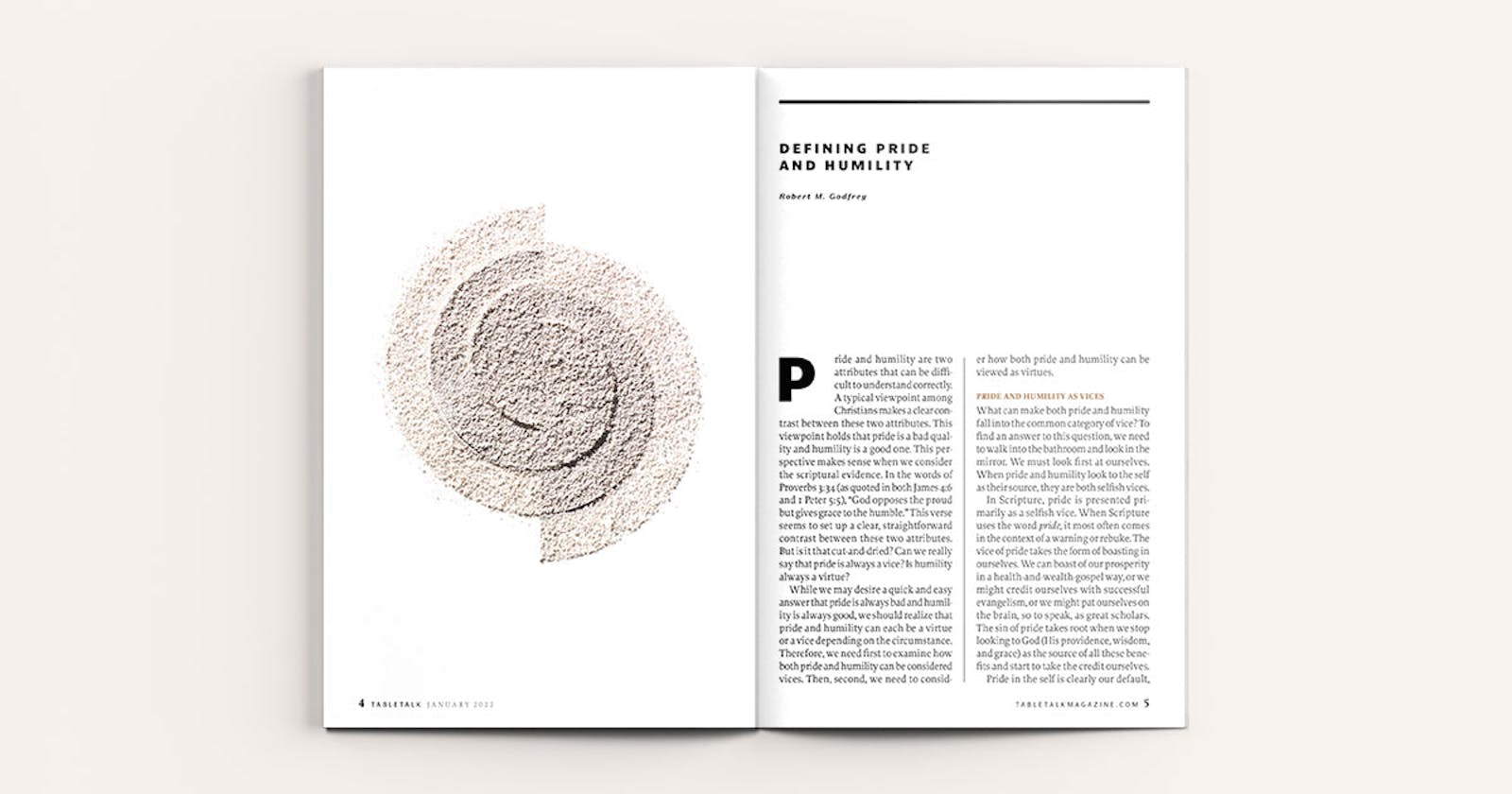
Request your free, three-month trial to Tabletalk magazine. You’ll receive the print issue monthly and gain immediate digital access to decades of archives. This trial is risk-free. No credit card required.
Try Tabletalk NowAlready receive Tabletalk magazine every month?
Verify your email address to gain unlimited access.
Pride and humility are two attributes that can be difficult to understand correctly. A typical viewpoint among Christians makes a clear contrast between these two attributes. This viewpoint holds that pride is a bad quality and humility is a good one. This perspective makes sense when we consider the scriptural evidence. In the words of Proverbs 3:34 (as quoted in both James 4:6 and 1 Peter 5:5), “God opposes the proud but gives grace to the humble.” This verse seems to set up a clear, straightforward contrast between these two attributes. But is it that cut-and-dried? Can we really say that pride is always a vice? Is humility always a virtue?
While we may desire a quick and easy answer that pride is always bad and humility is always good, we should realize that pride and humility can each be a virtue or a vice depending on the circumstance. Therefore, we need first to examine how both pride and humility can be considered vices. Then, second, we need to consider how both pride and humility can be viewed as virtues.
pride and humility as vices
What can make both pride and humility fall into the common category of vice? To find an answer to this question, we need to walk into the bathroom and look in the mirror. We must look first at ourselves. When pride and humility look to the self as their source, they are both selfish vices.
In Scripture, pride is presented primarily as a selfish vice. When Scripture uses the word pride, it most often comes in the context of a warning or rebuke. The vice of pride takes the form of boasting in ourselves. We can boast of our prosperity in a health-and-wealth-gospel way, or we might credit ourselves with successful evangelism, or we might pat ourselves on the brain, so to speak, as great scholars. The sin of pride takes root when we stop looking to God (His providence, wisdom, and grace) as the source of all these benefits and start to take the credit ourselves.
Pride in the self is clearly our default, and it works in us as a sinful vice. When Christ warned the Pharisees about self-righteous pride, He described them as those “who trusted in themselves that they were righteous, and treated others with contempt” (Luke 18:9). Yet, when we truly reflect on the weight of our sin and misery, selfish pride quickly deflates. Consider Paul, who, rather than boasting in all his own achievements and merits, began his writing as “chief” of sinners (1 Tim. 1:15, KJV). Furthermore, when we truly understand the good news of Jesus Christ, selfish pride and boasting find no room in our hearts. As Horatius Bonar declared, “I love because he loveth me, I live because he lives.” As those who owe our very lives to the grace and mercy of our Lord Jesus Christ, we must resist the temptation to be prideful in ourselves.
In a similar manner, we must also be on guard against humility that is rooted in ourselves rather than in God. The primary understanding of humility in Scripture tells us that it is a virtue, as we will consider shortly. However, when humility is based on ourselves, it falls into the same trap as selfish pride. If humility becomes centered on the self, then we find a virtue quickly turned into a vice.
The vice of self-centered humility appears in a number of ways. Self-loathing, cowardice, and false humility can all take place in the name of humility. Consider one example. If a strong Christian is asked to serve as an elder or deacon in his church, he may respond, “In all humility, I am unfit to serve.” However, the man may have no biblical reason for this humble response, and he may simply be confusing self-loathing with humility. We must be on guard against hating ourselves in the name of humility.
A vice of humility can also be seen in cowardice that leads to silence even when we should speak up. We may tell ourselves that by never opening our mouths when we encounter evil, we are being peacemakers or neighbor-lovers or are depending on God. However, this silence can quickly turn the virtue of humility into a vice of cowardice. So, when an extended family member mocks Christianity or when an old high school friend says that all religions are the same, we often fall silent in the name of humility when we are actually motivated by cowardice.
We must also be on guard against pretended humility, which is even worse than pride. The vice of pride is at least honest in its error. However, pretended humility is pride wearing a disguise. For example, a well-known pastor might say, “I never thought I could write five books in the span of a year, but I’m just thankful that my family supported me throughout this difficult task.” At first glance, this statement could sound humble, but in reality, it might be less about showing thankfulness and more about promoting the accomplishment and looking for acclaim.
As those who are alive in Christ, we must be putting off the vice of humility that masks itself as self-loathing, cowardice, or arrogance. We must flee from this vice and trust in the Lord. Only then can we turn to reflect on both pride and humility as virtues.
pride and humility as virtues
As looking to the self makes both pride and humility vices, looking away from the self to Christ turns these attributes to virtues. When we look to the Lord, both pride and humility can become true virtues.

In Scripture, we see appropriate examples of pride as a virtue. For example, Paul wrote, “In Christ Jesus, then, I have reason to be proud of my work for God” (Rom. 15:17). Notice that this picture of pride depends on the foundation of Christ and has the motive of serving God. Therefore, we as Christians are called to have pride in all that the Lord has given to us. We are to take pride in His sovereignty and salvation.
First, as we consider the sovereignty of God, it should never lead us to be proud of ourselves and our accomplishments. Rather, we should take pride in our Lord, the provider. As Christians, we may legitimately have pride when a degree is completed or in a discussion with friends in which we defend the faith or in the moment when our child is married to a fellow Christian. However, this sense of pride should not be in our own wisdom, our own wit, or our own wedding advice. Our pride should be found always and only in the Lord. Paul quoted Jeremiah when he proclaimed, “Let the one who boasts, boast in the Lord” (1 Cor. 1:31). God’s sovereign Word directs and guides us, and His sovereign will provides all that occurs in our lives. So let us take pride in our Lord.
Second, we can have pride in the gift of salvation that we have been given. As we are told in Hebrews 3:6, “Christ is faithful over God’s house as a son.” We are of His house if, in fact, we hold firmly to our confidence and the hope we take pride in. To have pride in our Savior is good. We should be proud of the new identity we have as prophets, priests, and kings. We should be proud that those who belong to the Lord Jesus Christ will never fall away finally from salvation. We should be proud to proclaim the truth of salvation in Christ alone. None of these examples of pride involves looking to ourselves. As Christians, we are called to have pride in our Savior, Jesus Christ. And just as virtuous pride looks to the Lord, so too a virtuous humility must look to the Lord.
Whenever we acknowledge the greatness of our God, we are led to true humility. The guilt of our sin and the grace that our Lord has given both lead to virtuous humility. When we acknowledge the weight of our sin, the fruit of humility grows. We have come from the fallen line of Adam and continue to struggle with sin on this side of glory. What a humbling truth. We should not take this as a call to return to the self-loathing of false humility. Rather, we should realize that we are united as a fellowship of sinners who are saints. Not one true Christian is of greater or lesser worth than another. Humility is the common attribute that we share with Moses, Paul, and Christ Himself (Num. 12:3; 2 Cor. 10:1). That is why Peter calls us to “clothe [ourselves] . . . with humility toward one another” (1 Peter 5:5). As sinners saved by grace, we all receive this call to put on humility. As Isaac Watts put it, “Blest are the humble souls that see their emptiness and poverty; treasures of grace to them are given, and crowns of joy laid up in heaven.” We are called, as those alive in Christ, to walk in humility.
conclusion
Let us hear the call to stop being proud and humble in a self-centered way and start being proud and humble in a godly way. We must be on guard from the vice as we grow in the virtue. One of the best ways to put off these vices and put on these virtues comes to us in prayer. When we speak to our sovereign Lord, we are given a true perspective on self. We must come as humble penitents. Our pride is grounded in our sovereign Father who will listen to us for the sake of His Son. Prayer humbles us as sinners, and prayer gives us confidence as we approach the throne of grace. So let us continue to go to our heavenly Father, by the power of the Holy Spirit, for the sake of Christ with pride in the triune God and humility that He calls us His people.
When we truly reflect on the weight of our sin and misery, selfish pride quickly deflates.
